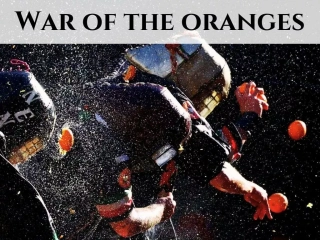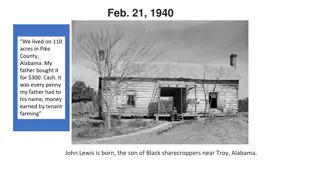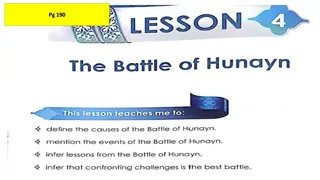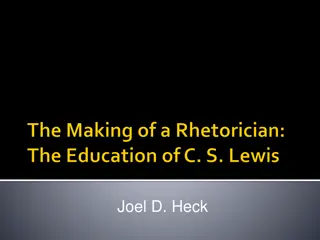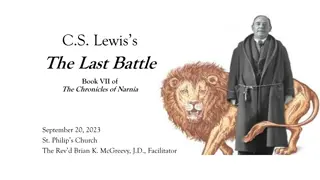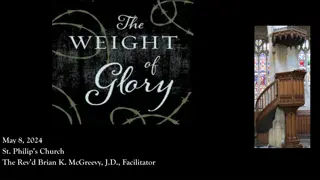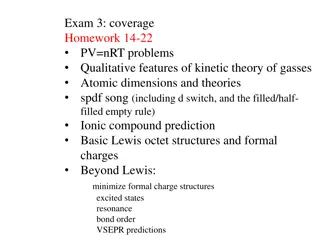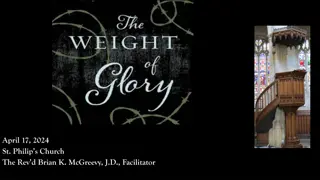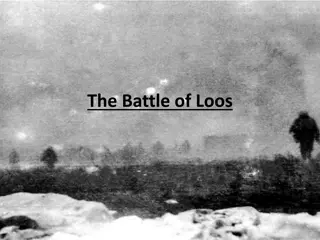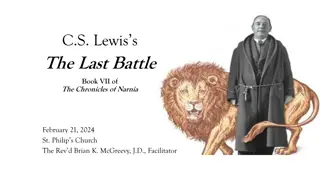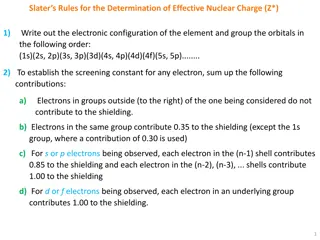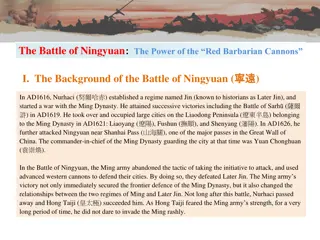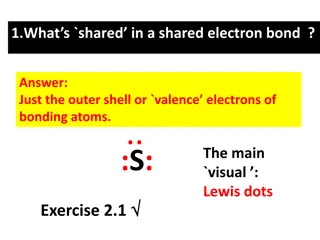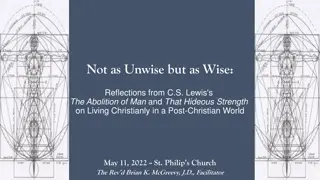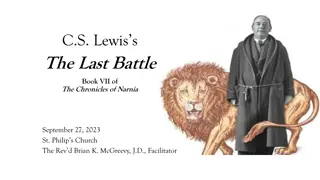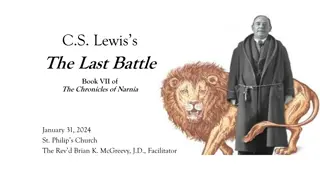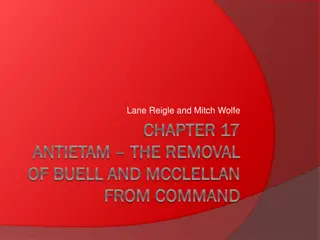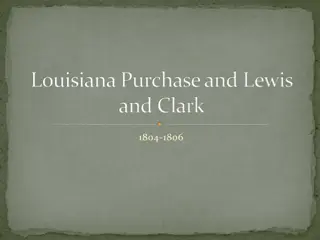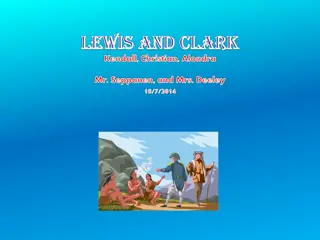Exploring Themes in C.S. Lewis's "The Last Battle
Delve into the intricate themes of sacrifice, redemption, and spiritual warfare in C.S. Lewis's "The Last Battle," the final book of The Chronicles of Narnia. Witness the epic conclusion as characters face their ultimate tests while grappling with profound truths about faith, love, and the eternal struggle between good and evil.
Download Presentation

Please find below an Image/Link to download the presentation.
The content on the website is provided AS IS for your information and personal use only. It may not be sold, licensed, or shared on other websites without obtaining consent from the author. Download presentation by click this link. If you encounter any issues during the download, it is possible that the publisher has removed the file from their server.
E N D
Presentation Transcript
C.S. Lewiss The Last Battle Book VII of The Chronicles of Narnia February 28, 2024 St. Philip s Church The Rev d Brian K. McGreevy, J.D., Facilitator
It is for freedom that Christ has set us free. Stand firm, therefore, and do not submit again to a yoke of slavery. For you were called to freedom, brothers. Only do not use your freedom as an opportunity for the flesh, but through love serve one another. For the whole law is fulfilled in one word: You shall love your neighbor as yourself. --Galatians 3: 1, 13-14
How to approach this class: --On the beach --Snorkeling --Scuba diving --Email list How to read this book: --Try reading aloud and slowly, looking for layers of meaning --Fine to read ahead
The Last Battle Book VII in The Chronicles of Narnia Completed in 1953 but first published in 1956, with illustrations by Pauline Baynes Is it a marvelous capstone work that draws all the children s Narnia stories to a fitting close? Or is it a profound reflection on the sin of Eden, the means of Grace, and the Glory of Heaven? Or is it a parable about following Jesus that is particularly applicable to 21st century America and the importance of Word and Truth?
Chapter 12: Through the Stable Door --Tirian and company huddle at the white rock, only to see a Calormene carry Eustace off through the stable door, beyond possibility of rescue --A battle ensues as the Dwarfs attack the Calormenes, and as the Calormenes prevail, they bind the 11 surviving dwarfs and offer them as a sacrifice, throwing them into what they call the Shrine of Tash, shouting "Tash! Tash! The great god Tash! Inexorable Tash! --Rishda offers terms to the Boar and Dogs and Unicorn, but they refuse, and the last battle of Narnia ensues --When Tirian realizes he cannot escape the stable door, he drags a terrified Rishda in with him and they both confront Tash, who plucks up Rishda, but a strong, calm voice then banishes Tash in Aslan s Name --Tirian is amazed to then encounter the Kings and Queens of Narnia, now including Jill and Eustace (but missing Susan), clean and noble and beautifully attired, and then discovers he too is now clean and beautifully dressed, and his heart beats fast with joy Themes in Chapter 12 --Fighting to the last strength for your friends is noble --Simple things like water from a rock in a time of crisis can provide comfort --Death is not the end and may be the doorway to Aslan s country --Evil and demonic false gods like Tash exist and are powerful, but not as powerful as Aslan --Aslan knows and protects his own --Pain and suffering and injury and age are replaced by Aslan with a clean and noble beauty --Not all enter into Aslan s presence
Chapter 13: How the Dwarfs Refused to Be Taken In --Tirian finds himself outside in a beautiful grassy field under a blue sky, close to a grove of wondrous fruit trees --Peter, Edmund, Lucy, Digory, and Polly recount how they were in a train station and suddenly taken into Narnia, and describe seeing Tirian and others come in through a door --A miraculous door is there standing in the middle of the field, but through the cracks between the boards you can see into Narnia as if looking out through the stable door --Lucy s joy at being in Narnia is diminished because of the dwarfs strange and unfriendly behavior; they do not seem able to perceive where they are in the same way as the others --Aslan appears and there is great joy; he sets a great feast for the dwarfs but they cannot understand what it is and reject it, turning the feast into a food fight Themes in Chapter 13: --The sensate beauty of the heavenly country --The healing of every infirmity, including age, in heaven --The joy of fellowship in heaven --The image of the door and ways of seeing looking at and looking through --The nature of the stable --The spiritual blindness of the dwarfs and the danger of cynicism
The sensate beauty of the heavenly country They stood on grass, the deep blue sky was overhead, and the air which blew gently on their faces was that of a day in early summer. Not far away from them rose a grove of trees, thickly leaved, but under every leaf there peeped out the gold or faint yellow or purple or glowing red of fruits such as no one has seen in our world. The fruit made Tirian feel that it must be autumn: but there was something in the feel of the air that told him it could not be later than June. They all moved towards the trees. Everyone raised his hand to pick the fruit he best liked the look of, and then everyone paused for a second. This fruit was so beautiful that each felt, "It can't be meant for me... surely we're not allowed to pluck it."What was the fruit like? Unfortunately, no one can describe a taste. All I can say is that, compared with those fruits, the freshest grapefruit you've ever eaten was dull, and the juiciest orange was dry, and the most melting pear was hard and woody, and the sweetest wild strawberry was sour. And there were no seeds or stones, and no wasps. If you had once eaten that fruit, all the nicest things in this world would taste like medicines after it. But I can't describe it. You can't find out what it is like unless you can get to that country and taste for yourself. Then the angel showed me the river of the water of life, bright as crystal, flowing from the throne of God and of the Lamb through the middle of the street of the city; also, on either side of the river, the tree of life with its twelve kinds of fruit, yielding its fruit each month. The leaves of the tree were for the healing of the nations. Rev. 22:1-2 How lovely is your dwelling place, O LORD Almighty! My soul yearns, even faints, for the courts of the LORD; my heart and my flesh cry out for the living God. Ps. 84:1-2 For you shall go out in joy and be led forth in peace; the mountains and the hills before you shall break forth into singing, and all the trees of the field shall clap their hands. Isaiah 55:12 On the holy mount stands the city he founded; the Lord loves the gates of Zion more than all the dwelling places of Jacob. Glorious things are spoken of you, O city of God. Ps. 87
The healing of every infirmity, including age, in heaven "It wasn't at all like that other time when we were pulled out of our own world by Magic. There was a frightful roar and something hit me with a bang, but it didn't hurt. And I felt not so much scared as well, excited. Oh and this is one queer thing. I'd had a rather sore knee, from a hack at rugger. I noticed it had suddenly gone. And I felt very light. And then here we were." "It was much the same for us in the railway carriage," said the Lord Digory, wiping the last traces of the fruit from his golden beard. "Only I think you and I, Polly, chiefly felt that we'd been unstiffened. You youngsters won't understand. But we stopped feeling old. But our citizenship is in heaven, and from it we await a Savior, the Lord Jesus Christ, who will transform our lowly body to be like his glorious body, by the power that enables him even to subject all things to himself. Philippians 3:20-21 So is it with the resurrection of the dead. What is sown is perishable; what is raised is imperishable. It is sown in dishonor; it is raised in glory. It is sown in weakness; it is raised in power. It is sown a natural body; it is raised a spiritual body. I Cor. 15:42- He will wipe away every tear from their eyes, and death shall be no more, neither shall there be mourning, nor crying, nor pain anymore, for the former things have passed away. Revelation 21:4
The joy of fellowship in heaven The earth trembled. The sweet air grew suddenly sweeter. A brightness flashed behind them. All turned. Tirian turned last because he was afraid. There stood his heart's desire, huge and real, the golden Lion, Aslan himself, and already the others were kneeling in a circle round his forepaws and burying their hands and faces in his mane as he stooped his great head to touch them with his tongue. Then he fixed his eyes upon Tirian, and Tirian came near, trembling, and flung himself at the Lion's feet, and the Lion kissed him and said, "Well done, last of the Kings of Narnia who stood firm at the darkest hour." Just as we have borne the image of the man of dust, we shall also bear the image of the man of heaven. For this perishable body must put on the imperishable, and this mortal body must put on immortality. I Cor. 15:49, 53 I tell you I will not drink again of this fruit of the vine until that day when I drink it new with you in my Father's kingdom. Mt. 26:29 Then I heard what seemed to be the voice of a great multitude, like the roar of many waters and like the sound of mighty peals of thunder, crying out, Hallelujah! For the Lord our God the Almighty reigns. Let us rejoice and exult and give him the glory, for the marriage of the Lamb has come, and his Bride has made herself ready; it was granted her to clothe herself with fine linen, bright and pure for the fine linen is the righteous deeds of the saints. And the angel saidto me, Write this: Blessed are those who are invited to the marriage supper of the Lamb. Rev. 19:6-9 That you may eat and drink at my table in my kingdom and sit on thrones judging the twelve tribes of Israel. Luke 22:30 What we shall later be has not yet been revealed. We do know that when it is revealed we shall be like him, for we shall see him as he is. 1 Jn 3:2
The image of the door and ways of seeinglooking at and looking through "But did I not come in out of the wood into the Stable? Whereas this seems to be a door leading from nowhere to nowhere." "It looks like that if you walk round it," said Peter. "But put your eye to that place where there is a crack between two of the planks and look through." Tirian put his eye to the hole. At first he could see nothing but blackness. Then, as his eyes grew used to it, he saw the dull red glow of a bonfire that was nearly going out, and above that, in a black sky, stars. Then he could see dark figures moving about or standing between him and the fire: he could hear them talking and their voices were like those of Calormenes. So he knew that he was looking out through the Stable door into the darkness of Lantern Waste where he had fought his last battle He looked round again and could hardly believe his eyes. There was the blue sky overhead, and grassy country spreading as far as he could see in every direction, and his new friends all round him, laughing. Truly, truly, I say to you, he who does not enter the sheepfold by the door but climbs in by another way, that man is a thief and a robber. But he who enters by the door is the shepherd of the sheep. So Jesus again said to them, Truly, truly, I say to you, I am the door of the sheep. John 10:1-2, 7 I pray that the eyes of your heart may be enlightened in order that you may know the hope to which he has called you, the riches of his glorious inheritance in his holy people, and his incomparably great power for us who believe. Ephesians 1:18 For now we see in a mirror dimly, but then face to face. Now I know in part; then I shall know fully, even as I have been fully known. I Cor. 13:12
Meditation in a Toolshed (1945) published in God in the Dock --C. S. Lewis I was standing today in the dark toolshed. The sun was shining outside and through the crack at the top of the door there came a sunbeam. From where I stood that beam of light, with the specks of dust floating in it, was the most striking thing in the place. Everything else was almost pitch-black. I was seeing the beam, not seeing things by it. Then I moved, so that the beam fell on my eyes. Instantly the whole previous picture vanished. I saw no toolshed, and (above all) no beam. Instead I saw, framed in the irregular cranny at the top of the door, green leaves moving on the branches of a tree outside and beyond that, 90 odd million miles away, the sun. Looking along the beam, and looking at the beam are very different experiences We must, on pain of idiocy, deny from the very outset the idea that looking at is, by its own nature, intrinsically truer or better than looking along. One must look both along and at everything. In particular cases we shall find reason for regarding the one or the other vision as inferior. Thus the inside vision of rational thinking must be truer than the outside vision which sees only movements of the grey matter; for if the outside vision were the correct one all thought (including this thought itself) would be valueless, and this is self-contradictory.
Lewis uses this metaphor [looking at v. looking along] to distinguish between two different modes, or postures, of knowing: looking at versus looking along. To look at something is to try and grasp it intellectually using reason to view it analytically from an objective, detached perspective. To look along something, on the other hand, is to engage with it experientially using one s physical senses or imagination to view it from a deeper, more personal perspective. In other words, to look at is to inspect to look along is to immerse. -Dr. Rachel Abouras From Letters to Malcolm: Chiefly on Prayer: I was learning the far more secret doctrine that pleasures are shafts of the glory as it strikes our sensibility. As it impinges on our will or our understanding, we give it different names-goodness or truth or the like. But its flash upon our senses and mood is pleasure. But aren t there bad, unlawful pleasures? Certainly there are. But in calling them bad pleasures I take it we are using a kind of shorthand. We mean pleasures snatched by unlawful acts. It is the stealing of the apple that is bad, not the sweetness. The sweetness is still a beam from the glory. That does not palliate the stealing. It makes it worse. There is sacrilege in the theft. We have abused a holy thing. I have tried, since that moment, to make every pleasure into a channel of adoration. I don t mean simply by giving thanks for it. One must of course give thanks, but I mean something different. How shall I put it?
We cant or I cant hear the song of a bird simply as a sound. Its meaning or message ( That s a bird ) comes with it inevitably-just as one can t see a familiar word in print as a merely visual pattern. The reading is as involuntary as the seeing. When the wind roars I don t just hear the roar; I hear the wind. In the same way it is possible to read as well as to have a pleasure. Or not even as well as. The distinction ought to become, and sometimes is, impossible; to receive it and to recognise its divine source are a single experience. This heavenly fruit is instantly redolent of the orchard where it grew. This sweet air whispers of the country from whence it blows. It is a message. We know we are being touched by a finger of that right hand at which there are pleasures for evermore. There need be no question of thanks or praise as a separate event, something done afterwards. To experience the tiny theophany is itself to adore. Gratitude exclaims, very properly, How good of God to give me this. Adoration says: What must be the quality of that Being whose far-off and momentary coruscations are like this! One s mind runs back up the sunbeam to the sun. If I could always be what I aim at being, no pleasure would be too ordinary or too usual for such reception; from the first taste of the air when I look out of the window one s whole cheek becomes a sort of palate down to one s soft slippers at bedtime.
The nature of the stable "It seems, then," said Tirian, smiling himself, "that the Stable seen from within and the Stable seen from without are two different places." "Yes," said the Lord Digory. "Its inside is bigger than its outside." "Yes," said Queen Lucy. "In our world too, a Stable once had something inside it that was bigger than our whole world." And while they were there, the time came for her to give birth. And she gave birth to her firstborn son and wrapped him in swaddling cloths and laid him in a manger, because there was no place for them in the inn Luke 2: 6-7
The spiritual blindness of the dwarfs and the danger of cynicism "Dearest," said Aslan, "I will show you both what I can, and what I cannot, do." He came close to the Dwarfs and gave a low growl: low, but it set all the air shaking. But the Dwarfs said to one another, "Hear that? That's the gang at the other end of the Stable. Trying to frighten us. They do it with a machine of some kind. Don't take any notice. They won't take us in again!" Aslan raised his head and shook his mane. Instantly a glorious feast appeared on the Dwarfs' knees: pies and tongues and pigeons and trifles and ices, and each Dwarf had a goblet of good wine in his right hand. But it wasn't much use. They began eating and drinking greedily enough, but it was clear that they couldn't taste it properly. They thought they were eating and drinking only the sort of things you might find in a Stable. One said he was trying to eat hay and another said he had got a bit of an old turnip and a third said he'd found a raw cabbage leaf. And they raised golden goblets of rich red wine to their lips and said "Ugh! Fancy drinking dirty water out of a trough that a donkey's been at! Never thought we'd come to this." But very soon every Dwarf began suspecting that every other Dwarf had found something nicer than he had, and they started grabbing and snatching, and went on to quarrelling, till in a few minutes there was a free fight and all the good food was smeared on their faces and clothes or trodden under foot. But when at last they sat down to nurse their black eyes and their bleeding noses, they all said: "Well, at any rate there's no Humbug here. We haven't let anyone take us in. The Dwarfs are for the Dwarfs." "You see," said Aslan. "They will not let us help them. They have chosen cunning instead of belief. Their prison is only in their own minds, yet they are in that prison; and so afraid of being taken in that they can not be taken out.
But even if our gospel is veiled, it is veiled to those who are perishing, whose minds the god of this age has blinded, who do not believe, lest the light of the gospel of the glory of Christ, who is the image of God, should shine on them. 2 Cor. 4:3-4 The natural person does not accept the things of the Spirit of God, for they are folly to him, and he is not able to understand them because they are spiritually discerned. I Cor. 2:14 To open their eyes, so that they may turn from darkness to light and from the power of Satan to God, that they may receive forgiveness of sins and a place among those who are sanctified by faith in me. Acts 26:18 For the mind that is set on the flesh is hostile to God, for it does not submit to God's law; indeed, it cannot. Those who are in the flesh cannot please God. Romans 8:7-8 But when one turns to the Lord, the veil is removed. 2 Cor. 3:16
IN PARADISUM Ancient Latin text from the Liturgy for Mass In paradisum deducant angeli: in tuo adventu suscipiant te martyres, et perducant te in civitatem sanctam Jerusalem. Chorus angelorum te suscipiat, et cum Lazaro quondam paupere, aeternam habeas requiem. May the angels lead you into paradise: may the martyrs receive you as you arrive, and bring you into the holy city of Jerusalem. May the choir of angels receive you, and with Lazarus, once a beggar, may you have eternal rest. Setting: from Requiem by Gabriel Faur , 1888, Paris
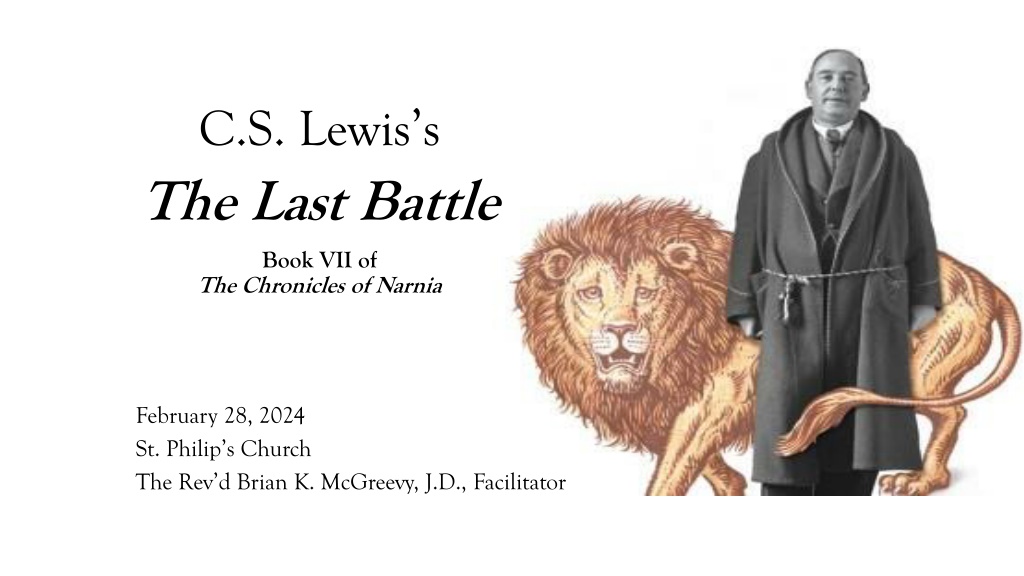

![READ⚡[PDF]✔ European Mail Armour: Ringed Battle Shirts from the Iron Age, Roman](/thumb/20552/read-pdf-european-mail-armour-ringed-battle-shirts-from-the-iron-age-roman.jpg)

